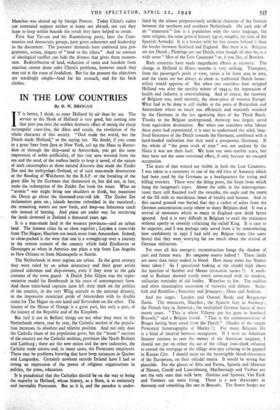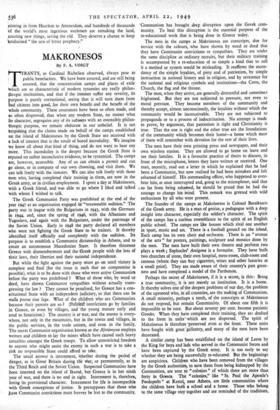IN THE LOW COUNTRIES
By D. W. BROGAN
IT is better, I think, to enter Holland by air than by sea. The service to the Hook of Holland is very good, but coming into that port you miss the sudden dramatic effect of seeing the sharp rectangular coast-line, the dikes and canals, the revelation of the whole character of this society. "God made the world, but the Dutch made Holland," so the saying ran. No doubt, if you come in a great liner from Java or New York, sail up the Maas to Rotter- dam or through the ship-canal to Amsterdam, you get the same impression of noble artificiality, of this tiny area wrested from the sea and the sand, of the endless battle to keep it saved, of the nature of such catastrophes as those natural disasters that made the Zuider Zee and the archipelago Zeeland, or of such man-made destruction as the flooding of Walcheren by the R.A.F. or the breaking of the great dike by the Germans that threatened to, but did not, in fact, undo the redemption of the Zuider Zee from the water. What an " atomic " war might bring one shudders to think, but meantime the Dutch go about the thousand-year-old job. The Zuider Zee reclamation goes on ; islands become imbedded in the mainland ; the remaining waters are now fresh, and deep-sea fishermen catch eels instead of herring. And plans are under way for retrieving
▪ the lands drowned in Zeeland a thousand years ago.
It is a man-made land in the western provinces—and an urban land. The famous cities lie so dose together ; Leyden a tram-ride from The Hague; Haarlem not much more from Amsterdam. Indeed, so close-packed is the west that one is a wrought-up over a journey to the remote corners of the country which hold Eindhoven or Groningen as when in America one plans a trip from Los Angeles to New Orleans or from Minneapolis to Seattle.
The Netherlands in most regions are urban. In the great century they were ruled by an urban aristocracy and their great artists painted aldermen and ship-owners, even if they were in the gala costume of the-town guard. A Dutch John Gilpin was the repre- sentative model for Rembrandt in his years of contemporary fame. And these train-band captains have left their, mark on the politics of the country, in the very Whig attitude to the national dynasty, in the impressive municipal pride of Amsterdam with its double scorn for The Hague on one hand and Rotterdam on the other. The history of the House of Orange is a great part, but only a part, of the history of the Republic and of the Kingdom.
But (tell it not in Belfast) things are not what they were in the Netherlands where, year by year, the Catholic section of the popula- tion increases its absolute and relative position. And not only does the Catholic share of the population grow, but the " boom " sections of the country are the Catholic sections, provinces like North Brabant and Limburg ; there are the new mines and the new industries, the Catholic trade unions and, in many cases, the Protestant employers. There may be problems brewing that have been nuisances in Quebec and Languedoc. Certainly nowhere outside treland have I had so strong an impression of the power of religious organisations in politics, the press, education.
It is paradoxical that the Catholics should be on the way to being the majority in Holland, whose history, as a State, is so eminently and inevitably Protestant. But so it is, and the paradox is under- lined by the almost preposterously artificial character of the frontier between the northern and southern Netherlands. On each side of an" unnatural " line is a population with the same language, the same religion, the same general history (up to, roughly, the time of the Spanish Armada). It is a border with far less reason behind it than the border between Scotland and England. But there it is. Belgians are not Dutch ; Flemings are not Dutch, even though all may be, in a wide sense " Men of the Low Countries " or, if you like, of Benelux.
Both countries have made magnificent efforts at recovery. The change in Holland in fifteen months is very striking. Transport, from the passenger's point of view, varies a lot from area to area, and the trains are not always as clean as traditional Dutch house- wifery would approve of. But when one considers how stripped Holland was after the terrible winter of 1944-5, the impression of health and industry is overwhelming. And of course, the recovery of Belgium was, until recently, the show-piece of western Europe. What had to be done is still visible in the ports of Rotterdam and Amsterdam where so much was efficiently and wantonly wrecked by the Germans in the last agonising days of the Third Reich. Thanks to the Belgian underground, Antwerp was largely saved from equivalent destruction. But when one considers what labour these ports had represented, it is easy to understand the solid, long- lived bitterness of the Dutch towards the Germans, combined with a hard-headed realisation that they need a prosperous Germany. If the whole of " the great work of time " was not undone by the Nazis it was not their fault. We have our own terrible scars, but. they have not the same emotional effect, if only because we escaped occupation.
The scars of that wound are visible in both the Low Countries. I was taken to a ceremony in one of the old forts of Antwerp which had been used by the Germans as a headquarters for trying and killing resisters. There were the firing posts, the beam from which hung the hangman's ropes. Above the table in the interrogation- room there still flaunted itself the swastika, the eagle and the motto of the SS with its murderous boast of loyalty and honour. And in this sacred ground was buried that day a casket of ashes from the German concentration camp where so many Belgians died. It was a revival of memories which so many in England now think better ignored. And it is very difficult in Belgium to exalt the resistance without openly or covertly criticising the exiled King. It is easy to be superior, and I was perhaps only saved from it by remembering how confidently in 5932 I had told my Belgian hosts (the same hosts) that they were worrying far too much about the revival of German militarism. — Yet over all this energetic reconstruction hangs the shadow of, past and future wars. Bis sanguine nostro indeed These lands' are more than twice soaked in blood. How many times has Namur been taken ? So I speculated looking at the citadel high above the junction of Sambre and Meuse (evocative names !). A week- end in Brabant showed nearly every cross-road with its modern,' utilitarian reminder of old battles. Waterloo 15 km. The endless and often meaningless succession of victories and defeats. Stein- kirk and Ramillies ; Fontenoy and Jemappes ; Mons and Arnhem.
And the sieges. Leyden and Ostend, Breda and Bergen-op. Zoom. The massacres, Naarden ; the Spanish fury in Antwerp ; the French fury in Antwerp ; the multiplied German furies of more recent years. "This is where Villeroy put his guns to bombard Brussels," said a Belgian friend. "That is the commemoration of Bruges having been saved from the Dutch." (Shades of the simple Protestant historiography of Motley I). For many Belgians life is a kind of interval between occupation. If I were an American Senator anxious to save the money of the American taxpayer, I should not put on either the act of the village loan-shark refusing to extend the mortgage or the village wise-guy refusing to be gypped in Kansas City. I should insist on the incorrigible blood-thirstiness of the Europeans, on their suicidal mania. It would be wrong but plausible. For the ghosts of Alva and Parma, Spinola and Maurice of Nassau, Conde and Luxembourg, Marlborough and Vauban are not the only ones that walk here. Grotius and Spinoza, Van Eyck and Vermeer are more living. There is a new skyscraper in Antwerp and something like one in Brussels. The flower barges are coming in from Haarlem to Amsterdam, and hundreds of thousands of the world's most ingenious workmen are remaking the land, !creating new things, saving the old. They deserve a chance to keep tindrained " the urn of bitter prophecy."



































 Previous page
Previous page